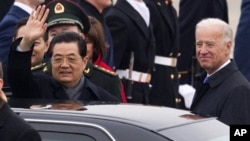China’s President Hu Jintao has arrived in Washington for a state visit. Obama administration officials say they will not avoid difficult issues in meetings with Mr. Hu.
President Hu’s two-day visit includes two dinners with President Barack Obama. Wednesday’s state dinner is the first for a Chinese leader at the White House in 13 years and only the third in Mr. Obama’s two years in office.
A private working dinner, shortly after Mr. Hu’s arrival on Tuesday, was expected to include Secretary of State Hillary Clinton, National Security Adviser Tom Donilon and Chinese aides.
After a formal arrival ceremony Wednesday morning, the two presidents will continue their talks, with a one-on-one meeting and an expanded meeting that includes advisers.
Both sides are emphasizing their desire for cooperation. White House spokesman Robert Gibbs calls the relationship between the two countries "cooperative but competitive."
|
Hu Jintao's Schedule in Washington |
He told reporters Tuesday the leaders will discuss both areas of agreement and more contentious issues. "We have a relationship, as I said, that yields substantial benefits. At the same time, we have some direct and difficult challenges. Most of those will be discussed [Wednesday]," he said.
Many of the issues to be discussed are economic. The United States and China are the world’s two largest economies, and Gibbs says the U.S. will sell $100 billion in goods and services to China this year.
However, the U.S. has an enormous trade deficit with China, and some senators are threatening higher export tariffs against Beijing.
Also, U.S. officials say China’s currency is vastly undervalued, which contributes to the trade imbalance.
Gibbs said the Chinese have taken some limited steps to revalue the yuan, but the Obama administration does not believe those efforts have been adequate. "We believe that more must be done. That is an opinion that is held not just by this country but by many countries around the world," he said.
Steven Dunaway, an adjunct senior fellow for international economics at the Council on Foreign Relations, says the Obama administration is starting to take a harder line on the currency issue. "I think there is increasing frustration, particularly on the exchange rate issue, with the pace at which the Chinese have advanced. And that has been reflected, I think, in a toughening of the stance of the administration," he said.
Differences over human rights are also expected to be on the meeting agenda.
Gibbs said Mr. Obama would continue to press his Chinese counterpart to release human rights activist and Nobel Peace Prize winner Liu Xiaobo from prison, as he has since the award was given last October.
The White House spokesman said the president has discussed human rights concerns with Mr. Hu in each of their previous seven meetings.
Chinese and American human rights activists plan to protest outside the White House on Wednesday.
At Tuesday’s White House briefing, reporters repeatedly pressed Gibbs on whether an invitation to a prestigious state dinner amounts to condoning China’s human rights policies.
The president’s spokesman responded that the invitation is simply a reflection of the growing importance of the Asian economies. "This is a dynamic region of the world, one that is growing faster than any other, and one that needs to have the full engagement of the United States of America. That has not always been the case," he said.
Mr. Obama’s other two state dinners were held for the leaders of India and Mexico.
John Boehner, the Speaker of the House of Representatives, has turned down an invitation to Wednesday’s state dinner. A Boehner spokesman said the top Republican lawmaker would have a chance to meet with Mr. Hu when he visits Capitol Hill on Thursday.
From Washington, the Chinese president goes to Chicago to meet with business leaders.




